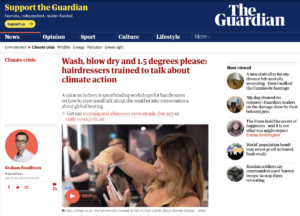Excerpts: Inside this chic Sydney hair salon, the chat between stylists and clients could be much the same as in any other hairdressers around the world. Some small talk. The ubiquitous and occasionally mundane chat about holidays and traffic. For regulars, the conversation can move to the deeply personal before you can say semi-tint or shag cut.
In fact, there is only one easily missable clue in the front window that conversations inside Paloma might, when the occasion arises, be a bit different. A poster reads: “This salon chats about love, life & climate action.”
“The weather is the hook. You can take a cue from that,” says Prof Lesley Hughes, one of two climate scientists who have helped run workshops to give hairdressers the tools for times when the conversation turns to the existential.
“You can show the science until you’re blue in the face but what can be more effective are people who you trust talking about it. It’s important to show it’s not a subject to be afraid of.”
More than 400 hairdressers have attended workshops as part of a project called A Brush With Climate being driven by Paloma’s owner, Paloma Rose Garcia.
During the sessions, hairdressers hear the basics of climate science and get to role play how conversations might go. They also take one of the posters back to their own salons.
“We’re relationship builders,” says Garcia. “We suggest some easy ways to introduce climate to the conversation and the biggest one is definitely the weather. But we encourage all the hairdressers to make it their own story.”
Some guests, she says “feel helpless and they’re a bit embarrassed that they don’t understand the science”, but want to know more. Mostly, clients accept the basis for climate action but don’t know what to do next.
Garcia tells a story about one regular client, a mother of two. After having the climate chat and talking about solar power and ethical banking, she left happy.
“She came back eight weeks later and she’s made all these changes. She was really proud. But also she’d been talking to all her girlfriends about it too. It might just be a 20-minute conversation but it can be really powerful.”
“Some women keep their hairdressers for a long time and they’ll tell them their secrets – they’re the unpaid therapist,” says Smith.
Not every chat – or even most of them – will be about climate change, say Smith and Garcia. As pseudo-experts in human social interactions, hairdressers tend to know when it’s time to go quiet or change the subject.
“For women, hair is so much a part of our identity and there’s a lot of trust that goes into that. You’re letting someone touch your hair and so you have to like them. That trust allows them to start that conversation.
Social researcher Dr Rebecca Huntley, author of How To Talk About Climate Change in a Way That Makes a Difference, also talks to the hairdressers at the workshops.
Huntley says hairdressers can reach important segments of the Australian public – people who make up about 40% of the population and are either concerned or cautious about climate, but don’t dismiss it or deny it’s a problem.
“We know those people tend to avoid newspapers or books or any information really that broadcasts itself as being about climate change,” says Huntley.
“But when we ask those people who they want to hear from about climate change they often say their friends and family. They’ll say climate change is a problem and they want to do more, but they want to hear that from people who are personally relevant to them and are relatable.”
Dr Hannah McCann, a senior lecturer in cultural studies at the University of Melbourne, is researching the social and emotional role that hairdressers have with their clients.
She says the hours at a time spent together, and the fact there’s plenty of touching, makes the relationship different from almost any other.
“It’s both social, with the chit-chat, but also people can end up disclosing a lot of things. I’ve theorised that’s because of the intimacy. You might talk to your Uber driver, but they’re not touching your hair.”



